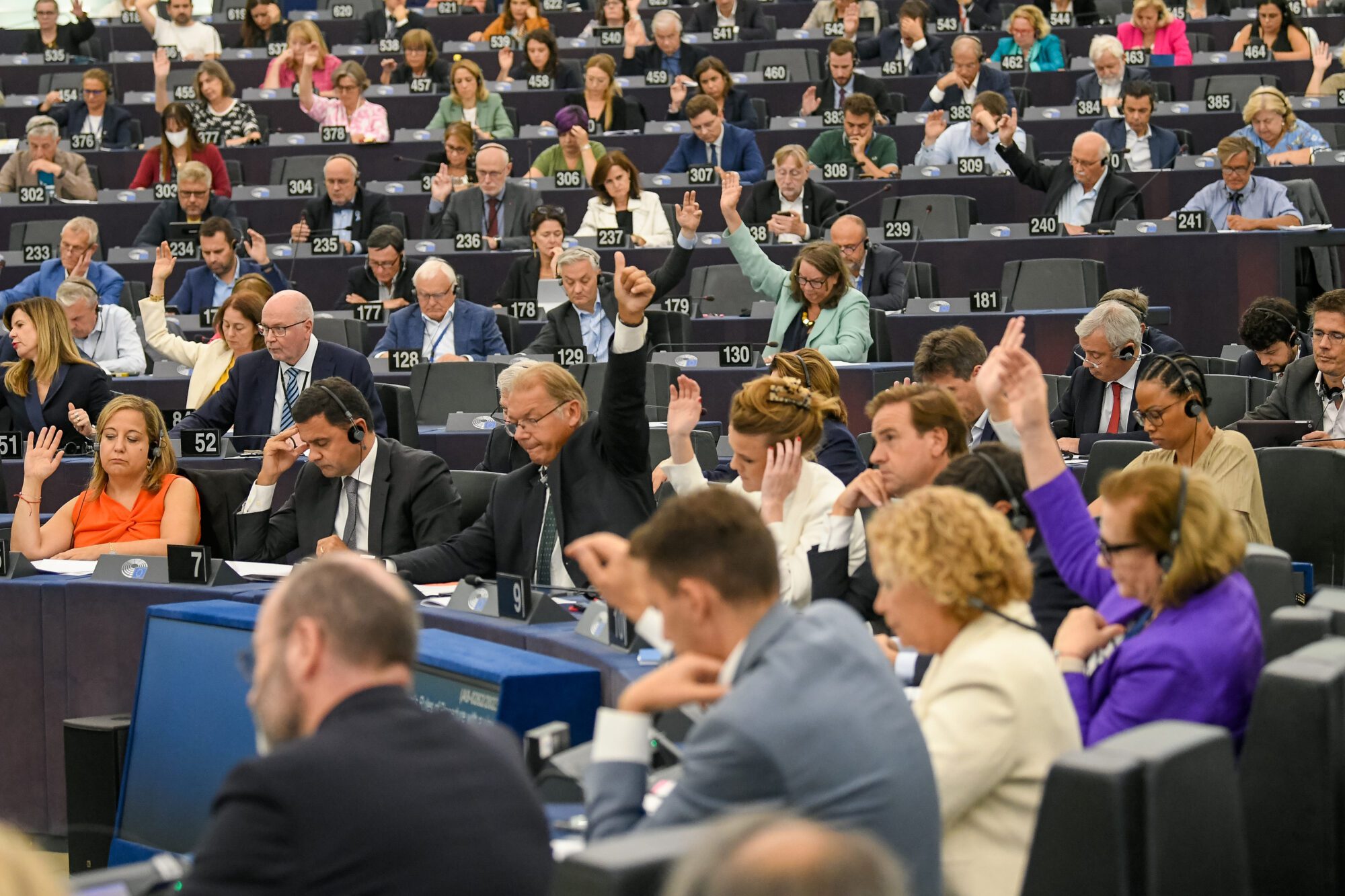
Photo: Philippe STIRNWEISS © European Union 2023 – Source : EP
The European Parliament’s plenary adopted a report on Thursday, September 14th, calling for restricting the Council’s legislative powers and stripping member states of their veto right while strengthening the powers of the parliament itself. The package would also grant voting rights to “mobile EU citizens” and lower the voting age to 16 across the entire bloc.
The success of the proposal to reform the EU’s entire decision-making process and increase democratic participation was celebrated by Alin Mituța, the liberal Renew’s co-rapporteur on the file:
We send a clear message to upgrade our democracy—a new EU Agora that involves citizens in European democratic life, the right for the European Parliament to initiate laws, and an end to unanimity in the European Council.
The report—now sent to the Council and the Commission for consideration—has been approved by 316 votes in favor, 137 against, and 47 abstentions. Naturally, the only ones to unanimously vote against it were the two conservative groups, the ECR and ID. The majority of MEPs in all other parties, including the center-right EPP, voted to support the final resolution.
What an exciting win for Europeans & participatory democracy at the @Europarl_EN! 👏
— European Movement (@EMInternational) September 14, 2023
MEPs have overwhelmingly voted for consolidating citizens' panels & better participatory tools, drawing inspiration from the Conference on the Future of Europe! 🇪🇺 #CoFoE pic.twitter.com/Ahwcpwd3wL
The report has three main components, each with several different proposals. Under ‘Parliamentarism,’ it calls for granting “direct right of legislative initiative” for the European Parliament (EP) to “lay down the strategic priorities of the [EU’s] legislative agenda” and to reconfigure the working relationship between the Parliament and the Council by transforming the two into a “genuine bicameral legislative system”—meaning, to take power from the member states and give it to the EP.
Furthermore, the text calls for fundamentally reforming the European Council by replacing unanimity with qualified majority voting “permanently by means of Treaty change,” which would take away member states’ individual veto rights and thus substantially weaken their sovereignty. It also suggests scrapping the model of the rotating presidency and replacing it with a permanent official (like in the case of the Commission and the EP), which—as Mituța argued in a recent opinion piece—would prevent non-desirable conservative countries, such as Hungary, from ever taking the lead.
In the second part, the report calls for the establishment of a “European citizenship” that would ensure that “mobile EU citizens” (European expats living in other EU countries) have the right to vote and to run for office in the country they are staying in. The text also suggests making EU citizenship available to third-country nationals (asylum seekers, for instance), introducing EU-wide referendums, and setting a single, standardized voting age limit by lowering it to 16 in every member state.
Finally, the package aims to increase democratic participation by creating a permanent deliberative mechanism called “European Agora” with the involvement of “randomly selected participants representing subsets of the socio-economic structure of the Union.” The Agora—and its subdivision, the ‘Youth Assembly’—would monitor, comment on, and complement EU institutions’ work throughout the year with additional input at all relevant levels.
According to Greens MEP Niklas Nienass, the other co-rapporteur of the file, these measures would “give our parliamentary democracy an update—to be prepared for a more global, digital, fast-moving world.”
Fortunately, there’s little chance of most of this ever becoming reality. After all, the proposal needs to be debated and approved by the Council itself, the very institution it ultimately seeks to weaken.
Some of these ideas have already been discussed in relation to other files in the Council, and—unsurprisingly—EU member states almost unanimously rejected any attempt to undermine their existing powers and authority.
Why would any member state, for instance, agree to give up its veto right? Yes, it’s an important tool in the hands of conservative governments seeking to protect their values against Brussels’ liberal majority, but the veto was and is frequently used by others too, including the largest member states, such as Germany and France. Governments are elected to represent their people, not everyone else.
Furthermore, conservative governments are unlikely to ever support a lower voting age since it would disproportionately favor leftist parties in almost every country. Giving voting rights to non-citizens, or holding EU-wide referendums sounds just as ludicrous to most.
German MEP Gunnar Beck (ID), who voted against the proposal in the subcommittee where it was initially presented, summarized the basic problems with the package to The European Conservative:
[The report] portrays the EU-wide referendum and the abolishment of unanimity in the Council as pillars of democracy. The opposite is true. Unanimity guarantees that no decision is made at [the] European level without the consent of all member states. No taxation without representation is a vital pillar of a true democracy. Also, there is no European demos; therefore, there is no European democracy; therefore, referendums can only be local, regional, or national.
Moreover, the report pleads for a general right of legislative initiative for the European Parliament. I strongly believe that the European Union is a union of free states. Therefore, the member states within the Council ought to be the sole law-giver[s] in the Union.
